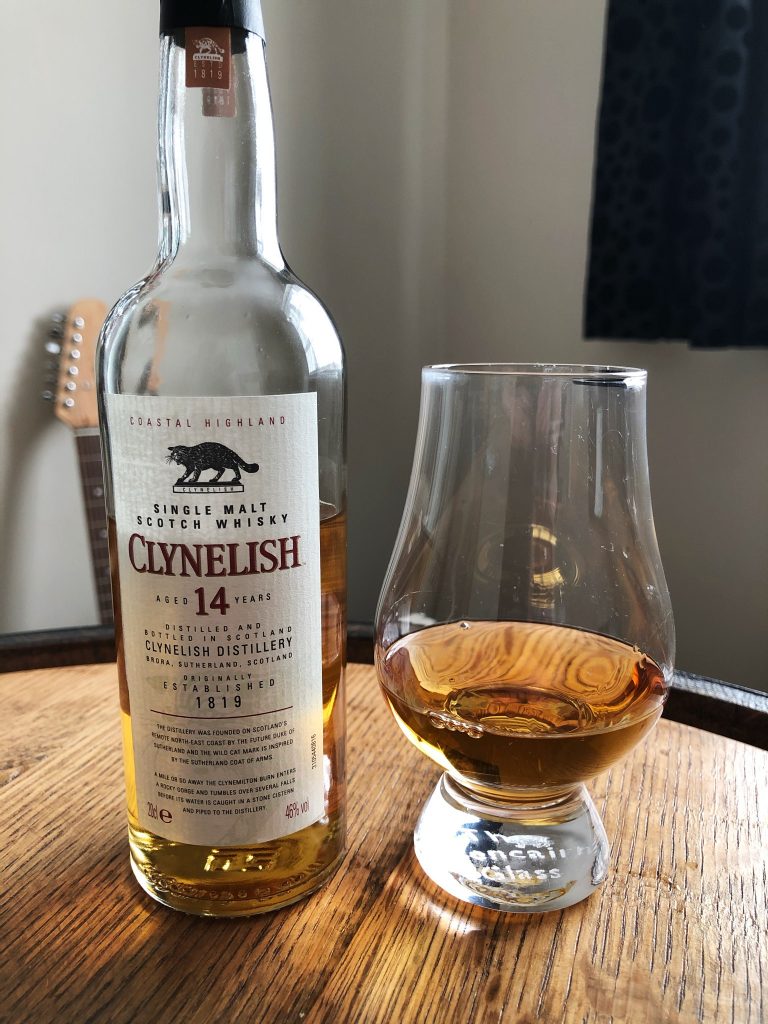Smaller bottles and Clynelish 14

Before I start talking about the whisky, I want to take a brief moment to talk about smaller bottles. I like them, and I wish more whisky was made available in them.
Now, i’m not talking about distillers and independent bottlers who sell all their product in 50cl bottles. That is becoming more and more common these days, and i’m sure it will become even more widespread as whisky prices rise further, and companies want to *appear* to keep the cost to the consumer down. Spirits such as gin are often 50cl as standard, and whisky will probably go that way too in the coming years. In the same way that chocolate bars get smaller and smaller – Remember what they did to Toblerone? – and the price remains the same, whisky could do it to us too. And they bloody well will if they can get away with it! Rightly or wrongly, it is the reason I am always reluctant to buy anything in a 50cl bottle. I don’t wish to normalise it. It’s a crusade I fear I am sure to lose.
When I talk about liking smaller bottles, I am talking about 20cl bottles. For me, this format is the perfect way to sample a whisky without having to splash out on a full size bottle. Samples are good, but you only get one or maybe two drams out of them, where as with a 20cl you are getting 4-8 glasses, depending on your size of pour. You can appreciate the whisky properly and spend some time with it.
Perhaps there is a fear people won’t go back and buy the larger bottle, but if you believe in your product, it shouldn’t be an issue. Whisky is expensive, and many of us can’t afford to buy as much whisky as we would like to try. 20cl is a great solution. If you love it, you then go and buy the 70cl.
I would also propose they sold limited releases that attract the flippers in 20cl bottles. It would enable more people to try the whisky, and the potential markup at auction for the flippers would be greatly reduced. What if they started selling Springbank Local Barley in 20cl bottles. Could you imagine the uproar that would cause? All those previous releases people have collected, pristine in their 70cl bottles, and lined up like ducks with their parafilm around the top. Then this little thing next to them. The sadist in me would quite enjoy that. Sorry guys!
This 20cl bottle of Clynelish cost me £13.95. My maths works that out to be the equivalent of £48.83 for 70cl, which is only a fraction above retail price. All good.
Clynelish caused a small gasp and chuckle amongst the whisky crowd recently, when they announced a 3000 bottle release of a 16 year old priced at £195. Two more years of maturation and 3.3% extra on the abv for an extra £150 or so. A fool and his money are soon parted, and there will be plenty jumping to buy it no doubt.
Officially, Clynelish has been around since 1819, but the distillery which makes the spirit today is a late 1960’s construction. The old distillery was eventually renamed Brora, before being closed in 1983, after just over a decade of existence. It is currently being brought back to life by owners Diageo.
That’s enough distillery history for this particular article, let’s get on with the tasting;
Nose : Is there a sherry influence here? I can’t find any official information to confirm or deny. The bourbon influence is much more prominent, but I am picking up a bit of sherry in the background, with notes of raisins and a hint of chocolate. There’s plenty of fruit, with an abundance of lemon, along with sharp apple, orange, grape and pear drops. Plain white candle wax, honeycomb, burnt caramel and menthol mint.
Palate : Sweet fruitiness continues with more sour lemon, orange and honey. There is a bitterness that soon develops, and the signature Clynelish waxiness is there, but not as overt as I expected. Clynelish is renowned for its wax, but the superb Deanston 18 would be much more on the waxy side than this. Then comes the green apple peels, sultana, ginger, white pepper and oak spice, with a good amount of salt in the finish. A finish which is drying, and moderate in length. It gets even more bitter too, with an earwax note at the end. Come on, we’ve all tried it as some point 😉
Conclusions : A really decent whisky, and the fact Diageo are presenting this to us with a 14 year old age statement, and at 46% for less than £50 has to be applauded, despite the obvious chill filtration and E150a. The only let down for me was the amount of bitterness on the back of the tongue in the finish. Nothing wrong with a bitter finish, but it just goes a bit too far for me. It’s a minor niggle, and probably costs it half a point.
It’s a shame Clynelish is becoming harder for the drinker to try a variety of, unless they are willing to fork out the high prices for independent bottlings. I can’t see anything for under £100, apart from this official 14 year old and the non-age statement Game Of Thrones release.
Score : 7/10
(Score descriptions can be found in the About page)
Three word review : Fruity. Waxy. Bitter
Vital statistics
ABV : 46%
Non-chill filtered : No
Natural Colour : No
Maturation : Predominently Ex-Bourbon casks, but nothing official to confirm percentages
Region : Highland
Colour : Golden Marmalade
